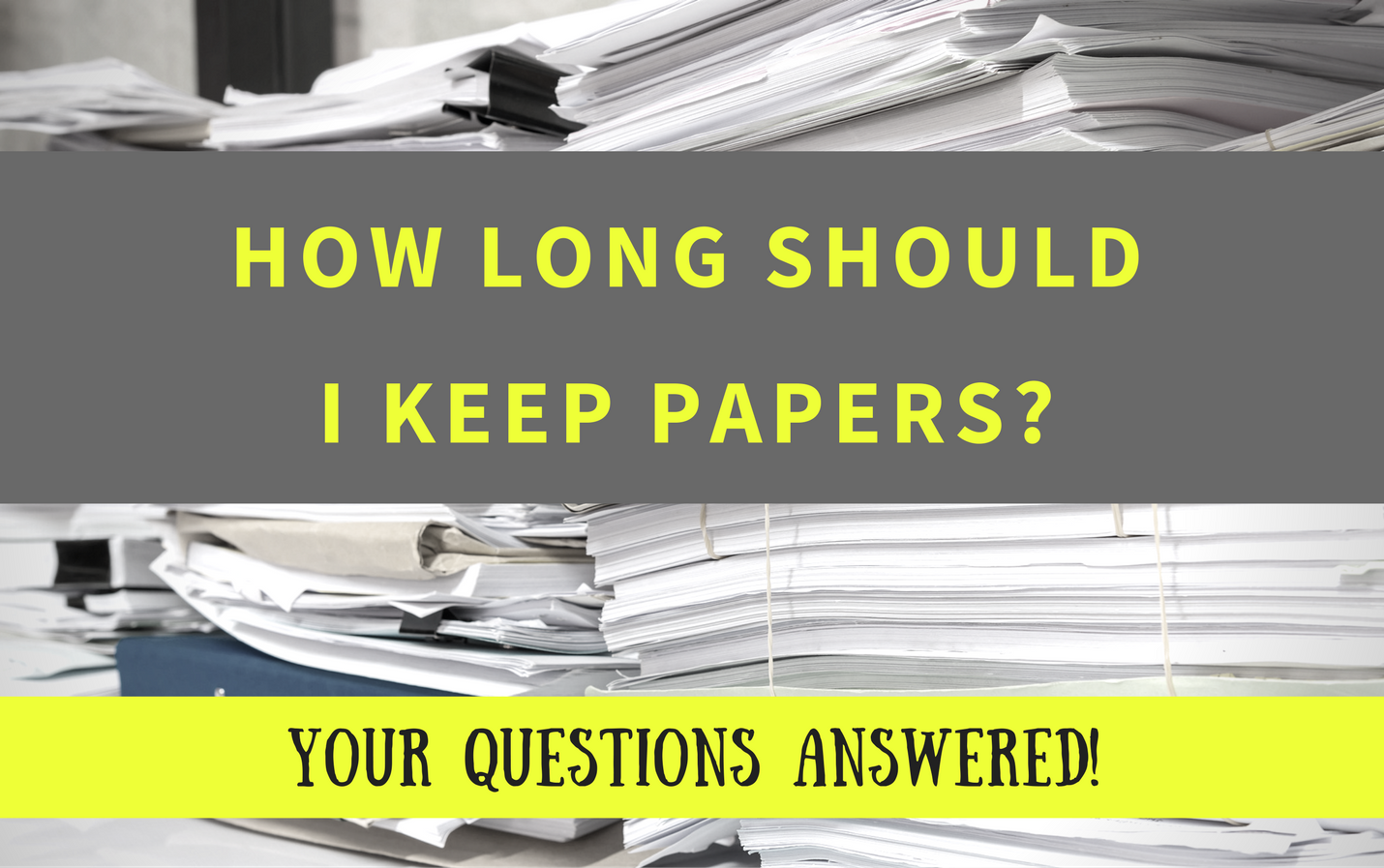When decluttering and organising files, a question I commonly get asked is, how long should I keep papers? In this article, we will look at the most common papers that people have in their homes and consider how long we should be keeping them for. This post is designed to provide general advice only, the papers that you need to keep can vary depending on your personal circumstances. If you are in doubt, you should seek professional advice.
HOW LONG SHOULD I KEEP PAPERS?
Papers are one of those things that you file away and rarely go back to. That is until space becomes a concern or you have to move. They very much fall into the “out of sight, out of mind” category.
The list below will help you identify what records you need to keep and how long you should be keeping them for.
Personal Tax Returns and Tax Documents
The Australian Taxation Office (ATO) recommends that you keep papers that pertain to your tax records for 5 years from the date you lodge your tax return. This includes any documents like group certificates, receipts and banks statements.
Payslips
Most of the laws relating to your employment have a statute of limitations of 7 years. This means that after 7 years you are usually unable to make a claim against your employer. For this reason, you only need to keep payslips for seven years. Anything older than this can be shredded and disposed of.
Business Tax Returns and Tax Documents
If you run a business or have income producing assets/investments you are required by law to be able to explain all transactions. You must, therefore, keep an electronic or paper copy of all records. As a general rule, the ATO requires you to keep records for 5 years from the date you lodge your tax return.
Bills
There is no set time frame that you are required to keep bills once they have been paid. You can elect to receive a digital copy of bills, as opposed to the paper versions. This is a great way to reduce paper clutter.
If there is a dispute that a bill has been paid, the transaction is usually able to be traced using your bank or credit card statement. It can sometimes be useful to keep some bills so you can go back over them and compare charges and fees. A good rule of thumb is to keep any bills that you may want to review at a later date for 12 – 24 months.
Bank, Credit Card and Superannuation Statements
Have you made the move to transition to paperless statements? If not now may be the time to ring around and request electronic copies of your statements for now on.
How often do you reference a paper bank statement when you are going through your accounts anyway? These days most people have access to their accounts online or through an App. These platforms usually give you the option to search the transactions made between two specified dates. So one may question if they really need to keep a physical copy of statements at all?
If you do need a statement in paper form, most institutions will reprint and issue them to you for a small research fee. You could check with you bank or financial institution to find out what the fee is. It is worth considering whether the time and effort it takes to file and keep paper copies of your bank statements are greater than the cost of replacing them in the event an unusual situation arises.
Receipts
How long you keep receipts really depends on what kind of receipts we are talking about. If receipts were used for tax purposes you are required to keep them for 5 years.
You should keep receipts for larger purchases for as long as the warranty covers them.
Receipts for smaller purchases can be kept for much shorter periods of time. Receipts for food and household supplies should be kept for 1 to 2 weeks just in case you need to return an item to the store.
Receipts for clothes and other household goods and home wares lose most of their value once you have removed them from their original packaging, taken off the tags or used them. Once this has happened you could consider keeping the receipt for a short time. This could be long enough to ensure the goods are not faulty. Once you are satisfied that you are not going to return an item you can get rid of the receipt. Keeping paper receipts that you are not going to use in the future takes up valuable space in your home and nobody wants that.
Official Paperwork and Identification Documents
You should always keep papers, like your birth certificate or other documents that prove your identity.
Certain identification documents like passports and licences expire. You can dispose of these of once you have replaced them. Make sure you dispose of them in a sensible manner, though. You don’t want them falling into the wrong hands.
Never throw away marriage certifications, university qualifications, police statements or any documents you may need for current or pending court appearances.
Warranties and instruction manuals
You should keep warranties for the period the item is covered. This could be anywhere between 1 year to a lifetime warranty. Warranties need to be dealt with on a case by case basis.
In Australia, you have rights under the consumer guarantees. This means that you may be able to request a return, replacement or repair even after any warranties you’ve got from a business has expired. You can find more about this HERE.
It is a good idea to photocopy your receipt or proof of purchase and attach it to the warranty so that if you need to make a claim all the papers you need are in the one place and easy to locate.
Most appliances have instruction booklets online these days. If you buy a new appliance, do a quick Google search for the PDF version. If the instruction book is available online you can dispose of the instruction booklet. How often do you actually refer to these instruction books anyway?
![[Tags] paper-files How Long Should I Keep Papers? uncategorized sorting office decluttering records paperwork keep papers file archive](https://sortthis.com.au/wp-content/uploads/2017/01/paper-files.jpg)
Medical records
You may need to assess whether you need to keep papers that relate to your medical records on a case by case basis. You should keep any records of you or your families’ vaccinations, immunisations and allergies. You will probably need this information at some point in the future. When you kids grow up you can pass this information onto them.
You should also keep any medical records that relate to a major illness or injury or any chronic and degenerative condition. It can be useful for your doctors to have access to old test results or x-rays to make comparisons. You should also keep any medical records that have been used for insurance or Centrelink claims unless you are certain that you can access this information another way in the future.
Many states in Australia require your doctor to keep medical records for seven years from the date of last entry or until a child turns 25 years of age. So there is another avenue to get copies of your medical records but there is a time limit and you may have to pay the practice a fee for accessing and printing your file.
You can throw away any old receipts for medical bills or medications once you have claimed them through Medicare or your private health insurance.
Your Home
There is certain home-related papers that you should keep such as any titles, legal records and insurance policies.
Rates, water and body corporate bills can usually be accessed through your local council or body corporate manager if needed. It is handy to keep 1 – 2 years so that you can refer to them and use them to do your household budget.
Your Car
It is worth keeping a copy of the last 1 – 2 years registration papers and a record of your insurance policies and what dates they cover.
You can claim on your insurance even though the period of coverage has passed. This means that if someone makes a claim against you for an incident that has happened in the past, you can still claim this against your policy for that year. You don’t need to necessarily keep a hard copy of old policies, but you should keep a record of which company you were with, your policy number and what dates that policy covers.
Children art
Children’s art is one of those items that are commonly hoarded. How hard is it to get rid of your little one’s masterpieces? There is no set rules for how many papers to keep and how many to get rid of. This is a personal choice and one that only you can decide.
If you do want to keep more than you are comfortable storing, consider take photos of them and storing them digitally or make them into a photo book.
Junk Mail and Newspapers
Junk mail is called “junk” mail for a reason. Old catalogues, promotional flyers, spamming letters and newspapers should be thrown out as soon as you have looked through them. Many of these items become useless once a certain time frame has passed. 99.9% of the time there is no reason for keeping these papers in your home and should be recycled as soon as you get the chance.
Disposing of your Papers
If you are disposing of papers, you may want to hire or buy a shredder. You could use them to light your fire in winter. You can also hire a lockable bin or secure bag, fill it with the unwanted paperwork and a company such as National Document Shredding Service can shred and dispose of the records for you. Whatever method you decide, the most important thing is to get them out the door once and for all.
![[Tags] paper-files How Long Should I Keep Papers? uncategorized sorting office decluttering records paperwork keep papers file archive](https://sortthis.com.au/wp-content/uploads/2017/01/Header.png)
Did you know we provide Professional Organising Services?
Contact us if you need help decluttering your home. Our in-home personal organising service is available to all clients living within a 25-kilometre radius of Gold Coast CBD.

